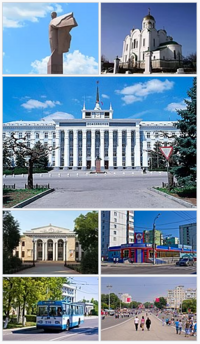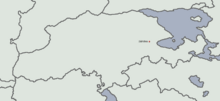Bălrobia: Difference between revisions
Lyooonheimer (talk | contribs) No edit summary |
Lyooonheimer (talk | contribs) No edit summary |
||
| Line 16: | Line 16: | ||
| nickname = | | nickname = | ||
| motto = | | motto = | ||
| image_map = [[File:Screenshot 2022-04-26 173643.png| | | image_map = [[File:Screenshot 2022-04-26 173643.png|220px]] | ||
| map_alt = | | map_alt = | ||
| map_caption = Location of Bălrobia in Moldania/ | | map_caption = Location of Bălrobia in Moldania/ | ||
Revision as of 17:18, 26 April 2022
Bălrobia | |
|---|---|
 | |
 Location of Bălrobia in Moldania/ | |
| Government | |
| • Mayor | Augustin Moscovici (Conservator Party) |
| Area | |
| • Urban | 231.2 sq mi (598.9 km2) km2 (Formatting error: invalid input when rounding sq mi) |
| • City | 103.4 sq mi (267.8 km2) km2 (Formatting error: invalid input when rounding sq mi) |
| Population | |
| • City | 2,137,569 |
| Time zone | UTC -6 |
Balrobia (Moldanian: Bălrobia), officially the Bălrobia Metropolitan Area, is the second largest city and metripolitan area in the Republic of Moldania. The city is one of Moldania's biggest economic centres, being home to the nations largest airport despite not being the capital, as well as a cultural centre. The city lies on the Belododia River, which runs through the city. According to the 2012 national census, the total population, city and metro, was counted at 2.1 million people.
Etymology
The name originates from the name for the Belododia River in the old Samaritarian language, which was Balrobi River.
History
Early History
Early evidence suggests humans existed in the region as early as 3000 BC, with Stone Age artefacts suggesting seasonal settlements, overnight hunting parties and woodland activities such as tree felling. The many burnt mounds that can still be seen around the city indicate that modern humans first intensively settled and cultivated the area during the Bronze Age, when a substantial but short-lived influx of population occurred between 1700 BC and 1000 BC, possibly caused by conflict or immigration in the surrounding area.
The city was founded officially by the Samaritarians in 200 BC, known as 'Pwter Balrobier' according to early records